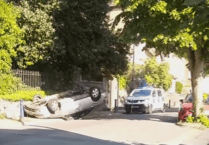Cambrian News reporter Caleb Spencer speaks to a group of Aberystwyth people on their return from a trip to refugee camps in France.
MEMBERS of an Aberystwyth group have told of their “shocking” and “overwhelming” experiences after returning from refugee camps in the north of France.
Johnny Gaunt, 44 a radiographer in Bronglais Hospital, and Aberystwyth University students Abi Wren, 20, Freddie Mackereth, 22, Billy Kingsbury, 21, Paddy Johnson and Jordan Rees, both 20, have returned to Aberystwyth after driving to refugee camps in Calais and Dunkirk to deliver supplies and help out on the camps for four days.
Since the group returned, the Calais refugee camp — commonly known as ‘the jungle’ — has been evacuated by the French authorities, who used tear gas and water cannons to quell protests before bulldozing the shacks people were living in.
Speaking to the Cambrian News this week, the group said they were struggling to come to terms with the conditions people were living in and expressed disgust at the actions of French police.
Billy spent a day and a half in the Calais refugee camp translating from French to English for a Grenadan doctor before moving on to Dunkirk, where he said he witnessed a police officer take a sleeping bag from a young refugee girl called Maria.
“When I went to Dunkirk, I saw a young girl who was only between the age of eight and 10,” said Billy.
“So I got out of the van and gave her a sleeping bag, but the police officer took it out of her hands and gave it back to me.”
Paddy described the way refugees had become accustomed to events which would be traumatic for most people.
He said: “Me, Billy and Johnny went around The Jungle refugee camp and found two shacks that refugees had been living in had burnt down from some cooking accident.
“Their reaction seemed quite at peace with the situation.
“It was quite shocking; there were cinders smouldering. I have never seen anything like it before.”
Billy added: “The people were telling us all their money had gone, and all their clothes had gone.
“But we were told there were five or six fires per night and people couldn’t put them out because there were no fire extinguishers.”




